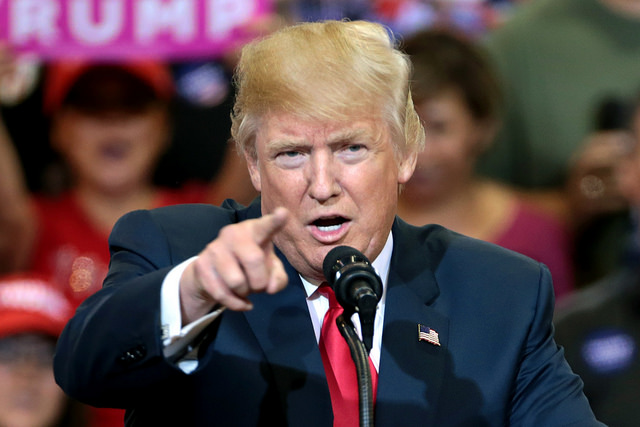The JCPOA is not the issue

The White House’s implacable hostility to the Iran nuclear deal—the Joint Comprehensive Plan of Action—coupled with the administration’s policy lockstep with Israel and Saudi Arabia on Iran, just brings the Middle East to the brink of war more quickly.
The wider Middle East region is a pressure cooker and the lid is likely to blow. Iran could quickly acquire a nuclear weapons capability towards the end of the JPCOA’s term. Cancellation of the agreement would just bring the potential timeframe forward. In either case, neither Israel nor Saudi Arabia can be expected to wait for Iran to acquire nuclear weapons before acting.
The chaos in Iraq and Syria has allowed Iran to strengthen its strategic position vis-à vis Israel and Saudi Arabia. The high cost of the Iraq–Iran War is also a factor in Iran’s desire to dominate its western flank. Irrespective of the merits of withdrawing from the JPCOA in the eyes of the US, Donald Trump’s approach is unlikely to bring Iran into negotiations for a new, wider agreement.
Despite the objections of the other JPCOA signatories and widespread international support for the agreement, the JPCOA itself is no panacea. The basic makings for a major conventional war in the wider Middle East are already present. Such a war would draw in all the great powers and have grave consequences well beyond the region. Any map will tell the tale.
China now has important strategic investments in Pakistan, and Xinjiang, its difficult western province, shares a border with Afghanistan. But China’s strategic interests go well beyond the stability of Iran’s eastern neighbours.
Central Asia and Transcaucasia are central to the Belt and Road Initiative. The BRI’s southern route options from China to Europe either traverse Turkmenistan–Iran–Turkey or take the trans-Caspian route of Kazakhstan–Azerbaijan–Georgia to Turkey. China may be prepared to deploy the PLA to defend its extensive BRI investments.
Transcaucasia and the Caspian Sea are already volatile areas. Iran has strategic interests in both, especially in Azerbaijan, which is 65–70% Shiite. Turkmenistan shares a long, remote border with Iran and could provide a logistics corridor if Russia decided to support Iran.
Russia’s Transcaucasian priorities are exemplified by its decision to build a naval base at Kaspiysk on the Caspian Sea. Russia demonstrated the strategic importance of the Caspian Sea in 2015 when it fired 26 cruise from there into Syria. The Caspian Sea also provides a secure resupply route to Teheran and would allow Russia to support Iranian military operations.
The Russians would oppose strongly the prospect of the Middle East being dominated by a US client state like Saudi Arabia or Israel. Russia has its own border security problems and strategic interests in Georgia, and may take advantage of any major turmoil to change the facts on the ground as it did in Crimea.
President Trump’s response to any crisis is going to be unpredictable. In Washington, support for Israel and the administration’s growing closeness to the Saudis would incline the US to provide substantial logistical support and intelligence, and perhaps military forces, in the event of a war with Iran. The US still maintains a strong interest in Afghanistan and Pakistan—a legacy of the ongoing war on terror—where Iran could foster a diversion.
Or, Trump might take an isolationist stance.
The Europeans would find themselves in an unenviable position. Despite their proximity to the wider Middle East they will presumably be reluctant to get involved with Russia sitting on Europe’s eastern border. A NATO response seems remote.
A war among regional powers, each supported by great power allies or sponsors, would likely be a long conflict of attrition. The devastation and numbers of displaced people and refugees might be orders of magnitude greater than those created by the Syrian civil war. An array of potentially unfavourable outcomes makes a European consensus on any crisis unlikely.
Israel or Saudi Arabia might take the rational strategic step that ignites the bonfire. They both probably believe they can rely on support from the Trump administration. Neither can be expected to wait for Iran to acquire nuclear weapons, either after the JCPOA expires or following its collapse.
The animosities and the loyalties in the region run deep. In the event of a conflagration in the wider Middle East, it’s possible that the region’s social, political, religious, and ethnic divisions will be inflamed by the upheaval with completely capricious results. The results could be revolutionary domestic changes in regional states and a reshaping the geopolitics.
The global disruption would be great. Indicatively, in total the Arabian peninsula, Iran and Transcaucasia hold over 50% of the world’s proven oil deposits and proven natural gas deposits. The inevitable energy crisis associated with a conflict in the Middle East would have a serious effect on economies worldwide, and the big geopolitical winners from soaring energy prices would be the US, Russia and Venezuela.
If the JCPOA survives, it provides only a breather. The uncertainties dominate. The complexities are inestimable. Simply taking a pro-Israel or an anti-Iran position in these circumstances is poor strategic policy.
Clausewitz observed, ‘War never breaks out wholly unexpectedly.’ The worst-case scenario here isn’t the least likely. In a more sensible time there might be a huge multilateral diplomatic effort to avoid the seemingly inevitable.
These are not sensible times.